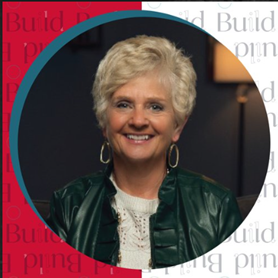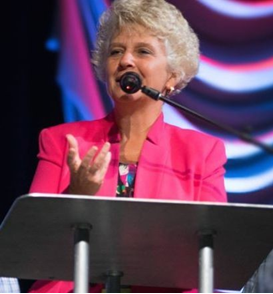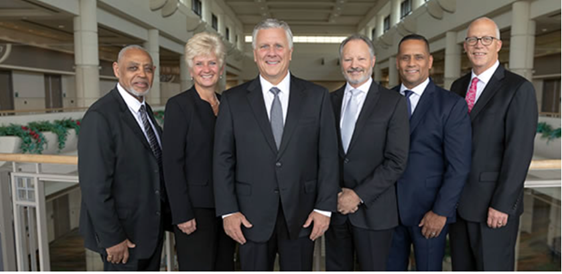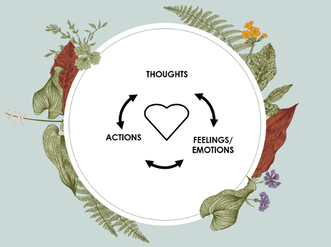|
This article was adapted from Trailblazer & Servant – By Christina Quick (first published in Influence magazine Issue 18 – July-Aug 2018)  On June 1, 2018, Donna Barrett began her term as general secretary of the Assemblies of God, becoming the first woman to serve on the Executive Leadership Team. The Ohio native’s selection demonstrates that the Fellowship’s egalitarian stance toward women in ministry extends even to the highest levels. Concerning this opportunity Donna shared, “I have a tremendous amount of admiration and respect for our general superintendent, Doug Clay, and our 21-member Executive Presbytery for making this move toward helping our Church be more relevant from the leadership table.” While Bro. Clay says Donna’s selection was not based on her gender, he acknowledges this is a historic occasion in the AG. “I know this moment will be meaningful for many women who feel God’s calling on their lives,” Clay says. Donna succeeded James Bradford, who resigned his post to serve as full-time lead pastor of Central Assembly of God in Springfield, Missouri. Donna’s faith journey began in 1975, when she accepted Christ as Savior and experienced the baptism in the Holy Spirit as a teenager at Highway Tabernacle Assembly of God in Youngstown, Ohio. As a young adult, Donna spent time working at a law office as a paralegal, while volunteering as a lay leader in her church. When she sensed God calling her to ministry, she pursued credentials through Global University, becoming an Assemblies of God licensed minister in 1988 and ordained in 1999.
“As Pentecostals, we’re awakened through the Scriptures to the reality that the Holy Spirit --- pours out on both men and women --- gives gifts, including the gift of leadership. If we neglect to open doors of opportunity, we are stifling the activity of the Holy Spirit.” As a church planter who led a congregation of just over 100, Donna brings valuable experience and perspective to her post. “Not only do I identify with 25 percent of our ministers who are women, but I identify with our small-church pastors, which is the larger number of our pastors,” she says. Donna hopes her presence on the Executive Leadership Team will encourage other women in the Assemblies of God to consider serving in church leadership positions. To women stepping out to follow a call to ministry, Donna adds, “Be faithful. Walk through whatever doors God opens for you, even it it’s scary. Participate actively, serve where invited. Honor your male colleagues and leaders as unto the Lord, and don’t have a chip on your shoulder. Work hard, be a lifelong learner, and take advantage of whatever training opportunities are before you.” Donna wants people to know her not just as a trailblazer for women leaders, but as a faithful servant to this diverse Fellowship and the kingdom of God. One of her favorite passages of Scripture is 1 Corinthians 1:3-4. She paraphrases it this way: “With the same grace you’ve received, turn and help others.”
When asked what she would like to be known for, Donna answered, “I want to be a prayerful, humble servant who helps the Church bring glory to God. Our superintendent, Doug Clay, has vision that I look forward to helping carry out.”
0 Comments
Often in ministry we are blessed with an insider view of God’s grace and His working in the lives of individuals. Pastor Kathy Dana shares her experience with this blessing. Thank you, Kathy for sharing with us. A view from the communion table Written by Pastor Kathy Dana The calling to be a pastor is an awesome privilege. We become part of the lives of people God has entrusted to us. We hold very intimate details of their lives. It can be hard. It can be lonely. Yet, it is the greatest blessing of our life's calling. Among those blessings, I am thankful for the pastor's blessing of the view from the communion table. God revealed this blessing to me on Christmas Eve a few years ago. I was serving the elements at the communion table and as I waited, I looked over the congregation. The Holy Spirit revealed to me the precious saints preparing for communion. I have had the privilege of ministering to many of them through their most difficult seasons of life. I was overwhelmed with the revelation of how God had brought them through. As pastors we see...
As pastors and ministry women, we are blessed to see all these things and more. The view from the communion table is a gift from God – a glimpse of God’s glory revealed through His people. Jump into the conversation:
Written by Rachel Quigley Dave and I were gifted a dinner date at Texas de Brazil. This is an elaborate smorgasbord meat buffet that comes right to your table. Their meats are fabulous and thinking back on that meal makes my mouth water. It’s on the expensive side so friends told us, “Go hungry and get your money's worth!” Our hostess explained how the meal would go. Our side dishes would be brought to our table and served family style. We could enjoy endless salad bar trips, and the green/red card on our table would let the meat buffet servers know when we wanted more or were ready for a rest. While enjoying our sides and salads, we indulged in a parade of varying meats carved and served to us at our table. The green side of our card sat there letting the servers know we were open to them bringing us more meat. When we were full we had the option of turning our card to show red - stop bringing us food! Dave and I love a good meal. There’s something about savoring the flavors and tenderness of the various meats. There was filet mignon wrapped in bacon, parmesan-crusted pork loin, garlic picanha, and so many other delectable cuts of meat. It was amazing and we were glad we had gone hungry so we could fill up on all the goodness. But then something started happening. What was just moments before savory and delicious was now not sitting well in my gullet. I was stuffed and overextended. The variety began to fade and all the tastes blended together in a mixture of sameness. I began regretting all that commitment. I indicated to the servers I was done by turning my card to 'red' but they kept coming. I began feeling guilty for the unfinished meat on my plate. I was way beyond my capacity. I was no longer savoring but instead regretting my choices and just wanted to leave. Sometimes in life we find ourselves in similar scenarios. We commit to areas of ministry thinking it’s good and amazing. We enjoy the richness of serving and meeting the needs of others. But then our schedules are stuffed and we’re overextended. And even though we hold up the ‘red’ stop cards, people and tasks don’t seem to recognize our fullness. When we are stuffed beyond capacity, our tells show.
Margin is the fuel reserve for our lives. When we have no margin our engines seize up and we’re left on the side of the road. To honor our capacity, how can we create margin in our lives? Recognize we are responsible for creating the boundaries in our lives. We set the parameters. This requires strategy and intentionality.
God created us for whole living. His desire is that we live abundant lives – not through over stuffing, overextending, or over committing but through:
In these areas of Living in Wholeness, Life Giving Relationships, and Honoring our Capacity, we can flourish and live richer lives by applying these principles to our lives. Jump into the conversation:
Written by Rachel Quigley
God made us out of relationship for relationship. In our search for wholeness, we can’t live whole alone. Relationships are essential for wholeness. In the beginning, Adam had a relationship with God and Adam had purpose. Yet God said that’s not enough. Adam needed another to journey with him. We need others in our lives. We were created to need others in our lives and for healthy relationship. We are needy individuals, and sometimes we don’t like to admit that simple truth. ingredients. I’d be out of sugar, or vanilla, or one egg short. Mom would say, Run next door to Mrs. Rodger’s house and ask to borrow what you need. When I was all done baking, Mom would again say, "Take some cookies over to Mrs. Rodgers and share with her since she shared with you." With my cookies on a pretty plate, I would head over to Mrs. Rodgers. This was part of the process and a true gift of relationship. I loved baking, and Mrs. Rodgers enjoyed the company of the little girl next door. Nowadays, if we bake and find ourselves short an egg, sugar, or flour, we don’t typically go next door but instead we Instacart, run to the store, or text someone to stop by the store on their way home. We’ve lost that interdependent community of needing and connecting with those near us --- our community. God created us for relationships but in today’s world we find ourselves alone and not connected in healthy, life-giving community circles and friendships. Author Jennie Allen shares some great ideas and insights in building community in her book, Find Your People. Below are some ideas she shares: Proximity – Who is around you?
Transparency – Have an open door Everyone doesn’t need to know our business and we don’t need to share everything however we can practice healthy levels of transparency and live in authentic relationship with others.
Accountability – Iron Sharpens Iron
Shared Purpose—Connecting together creates bonds
Consistency– Choose to stay when days are difficult
Keep short accounts. Be quick to apologize. Aim to be a peacemaker.
Consistency is clocking hours together over years. Those kinds of relationships and communities bring great rewards. Those relationships, though difficult at times, produce life giving, life journeying friends and community. Written by Rachel Quigley This perfect mindset can mess us up. We’re often hindered by believing we must be perfect or at least portray perfection. Yet Paul writes in Romans 3:23 “All have sinned and fallen short.” We all miss the mark. So, if God knows we are not perfect and in our human state we are not able to obtain perfection what does Jesus mean when He says, “Be perfect.” The translation of the word perfect is similar to other translated words where we don’t quite have an adequate English word to represent what the Greek word means. It’s like the word love. We love our families and we love cheeseburgers yet those love definitions are not equally weighted. In our English language we understand perfect as a performance-based target where we aim, shoot, and hit the bullseye every time. Yet the word perfect (Greek translation = Teleios) in this verse means completion, wholeness, maturity. The call to perfection (teleios) in this verse is the same call to holiness we see throughout the Old and New Testament. It’s not calling us to moral perfection but instead wholehearted orientation toward God. Teleios is an intentional, purposeful wholeness of a person. Instead of looking at perfection as unattainable, a better reframing of perfection in this context would be wholeness, completeness, whole living, flourishing growth. Whole health is caring for ourselves well. God cares about our whole being. He is Spirit, yet He became flesh to dwell among us (John 1:14). Jesus, who is fully God and fully man, took on the vulnerability and beauty of being human. He enjoyed eating meals and napped when He was tired. He wept with His close friends and He stood up to injustice. God’s work of redemption includes the restoration of our body, mind, and soul. He cares for our whole being. (spiritually, emotionally, physically, mentally, relationally) Wholeness in these areas brings a sense of balance and wholeness in our living. Many of us struggle in balancing these areas. We find when we are lacking in one area, it impacts other areas of living. For example, when physically tired, our emotions are edgy and mental capacities can wane. These areas impact each other. Keeping balance in our schedules, staying rested, making healthy decisions, and other disciplines will help tremendously. But what else can keep us from flourishing in our lives? One is our thoughts and patterns. Proverbs 23:7 says, As a man thinks in his heart, so is he. Our thoughts circle around to our actions or inactions and those decisions give us the results of our life. Our thoughts become things. Our thoughts create feelings, and our feelings can drive our actions or inactions. For example,
How can we change our thought patterns?
1. Recognize our faulty thinking - We can self-sabotage our own growth by letting our thoughts and fears of failure do us in before anyone else has a chance to. 2. Be kinder to ourselves and others in our thought life – Changing our thought practices will help us see and notice our thought patterns. Reigning in our thoughts and making them obedient to Christ changes things at the root level. ~ Philippians 4:8, Whatever is true, noble, right, pure, lovely, admirable… if anything is excellent or praiseworthy… think on these things. ~ Romans 12:2 Do not conform to the pattern of this world, but be transformed by the renewing of your mind. Then you will be able to test and approve what God’s will is --- His good, pleasing, and perfect will. ~ 2 Corinthians 10:5 We take captive every thought to make it obedient to Christ. 3. Tune in, Listen, and Obey the Holy Spirit’s leading. – We achieve a greater sense of wholeness in our lives when we lean into God’s idea of wholeness. This leads to flourishing growth and goodness in our lives. The pressure for posting perfection is exhausting and yields fleeting results. But living in the fullness of whole living, completeness, and moving towards maturity brings a flourishing that yields joy, satisfaction, purpose, and glory to the Father who brings good to our lives. And that is worth posting about! |
















